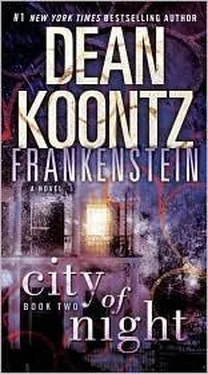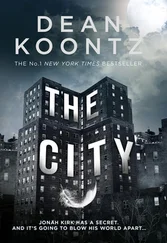“From gestation to maturity, he’s got it down to four months in the tank.”
“How many tanks are in operation at the Hands of Mercy?”
“There used to be one hundred and ten.”
“Three crops a year,” Deucalion said, “times one hundred ten. He could turn out three hundred and thirty a year.”
“Not quite so many. Because now and then he makes… other things.”
“What other things?”
“I don’t know. Rumors. Things that aren’t… humanoid. New forms. Experiments. You know what I’d like?”
“Tell me,” Deucalion encouraged.
“One last piece of chocolate. I like chocolate very much.”
“Where do you keep it?”
“There’s a box in the fridge. I’d get it, but I’m beginning to have some difficulty with recognition of spatial relationships. I’m not sure I can walk properly. I’d have to crawl.”
“I’ll get it,” Deucalion said.
He fetched the chocolates from the refrigerator, took off the lid, and put the box on the table before Laffite.
As Deucalion settled into his chair again, Laffite reached for a piece of candy, but groped beyond and to the left of the box.
Gently, Deucalion guided Laffite’s right hand to the chocolates and then watched as the pastor felt piece after piece, almost like a blind man, before selecting one.
“They say he’s ready to start up a farm outside the city,” Laffite revealed. “Next week or the week after.”
“What farm?”
“A New Race farm, two thousand tanks all under one roof, disguised as a factory or greenhouses.”
When Laffite could not find his mouth with his hand, Deucalion guided the candy to his lips. “That’s a production capacity of six thousand.”
Closing his eyes once more, Pastor Laffite chewed the candy with pleasure. He tried to talk with the chocolate in his mouth but seemed no longer capable of speaking while he ate.
“Take your time,” Deucalion told him. “Enjoy it.”
After swallowing the chocolate and licking his lips, still with his eyes closed, Laffite said, “A second farm is under construction and will be ready by the first of the year, with an even greater number of tanks.”
“Do you know Victor’s schedule at the Hands of Mercy? When does he go there? When does he leave?”
“I don’t know. He’s there much of the time, more than anywhere else in his life.”
“How many of your kind work at Mercy?”
“Eighty or ninety I think. I don’t know for sure.”
“Security must be tight.”
“Everyone who works there is also a killing machine. I might like a second chocolate.”
Deucalion helped him find the box and then get the morsel to his mouth.
When Laffite was not eating chocolate, his eyes rolled and twitched beneath his lids. When he had candy in his mouth, his eyes were still.
After he finished the sweet, Laffite said, “Do you find the world more mysterious than it’s supposed to be?”
“Who says it isn’t supposed to be?”
“Our maker. But do you find yourself wondering about things?”
“About many things, yes,” Deucalion said.
“I wonder, too. I wonder. Do you think dogs have souls?”
On the walkway at the foot of Lulana’s frontporch steps, with the sweet scent of jasmine on the early-night air, Carson said to the sisters, “It’s best if you don’t tell anyone a word about what happened at the parsonage.”
As though distrusting the steadiness of her hands, Lulana used both to hold the praline pie. “Who was the giant?”
“You wouldn’t believe me,” Carson said, “and if I told you, I wouldn’t be doing you a favor.”
Coddling the second pie, Evangeline said, “What was wrong with Pastor Kenny? What’s going to happen to him?”
Instead of answering her, Michael said, “For your peace of mind, you ought to know that your preacher long ago went to his final rest. The man you called Pastor Kenny there tonight… you have no reason to grieve for him.”
The sisters exchanged a glance. “Something strange has come into the world, hasn’t it?” Lulana asked Carson, but clearly expected no answer. “There tonight, the coldest expectation crept over me, like maybe it was… end times.”
Evangeline said, “Maybe we should pray on it, sister.”
“Can’t hurt,” Michael said. “Might help. And have yourselves a piece of pie.”
Suspicion squinted Lulana’s eyes. “Mr. Michael, it sounds to me like you mean have ourselves a nice piece of pie while there’s still time.”
Michael avoided replying, but Carson said, “Have yourselves a piece of pie. Have two.”
In the car again, as Carson pulled away from the curb, Michael said, “Did you see the white Mercury Mountaineer about half a block back on the other side of the street?”
“Yeah.”
“Just like the one in the park.”
Studying the rearview mirror, she said, “Yeah. And just like the one down the street from the parsonage.”
“I wondered if you saw that one.”
“What, I’m suddenly blind?”
“Is it coming after us?”
“Not yet.”
She wheeled right at the corner.
Turning in his seat to peer into the dark street that they were leaving behind, he said, “They’re still not coming. Well, there’s bound to be more than one white Mountaineer in a city this size.”
“And this is just one of those freaky days when we happen to cross paths with all of them.”
“Maybe we should have asked Godot for some hand grenades,” Michael said.
“I’m sure he delivers.”
“He probably gift-wraps. Where now?”
“My place,” Carson told him. “Maybe it would be a good idea, after all, if Vicky moved Arnie somewhere.”
“Like some nice quiet little town in Iowa.”
“And back to 1956, when Frankenstein was just Colin Clive and Boris Karloff, and Mary Shelley was just a novelist instead of a prophet and historian.”
On the six closed-circuit screens, the insectile manifestation of the Werner entity, still in possession of some human features, crawled the steel walls of the isolation chamber, sometimes in the cautious manner of a stalking predator, at other times as quick as a frightened roach, agitated and jittering.
Victor could not have imagined that any news brought to him by Father Duchaine would trump the images on those monitors, but when the priest described the meeting with the tattooed man, the crisis with Werner became a mere problem by comparison with the astonishing resurrection of his first-made man.
Initially skeptical, he pressed Duchaine hard for a description of the towering man who had sat for coffee with him in the rectory kitchen, particularly of the ravaged half of his face. What the priest had seen under the inadequate disguise of the elaborate tattoo was damage of a kind and of a degree that no ordinary man could have sustained and survived. Further, it matched the broken countenance as Victor had kept it in his mind’s eye, and his memory was exceptional.
Further still, Duchaine’s word portrait of the wholesome half of that same face could not have better conveyed the ideal male beauty that Victor had been kind enough to bestow upon his first creation so long ago and on such a distant continent that sometimes those events seemed like a dream.
His kindness had been repaid with betrayal and with the murder of his bride, Elizabeth. His lost Elizabeth would never have been as malleable or as lubricious as the wives that he had later made for himself; nevertheless, her savage murder had been an unforgivable impertinence. Now the ungrateful wretch had come crawling around again, filled with delusions of grandeur, spouting nonsense about a destiny, foolish enough to believe that in a second confrontation he might not only survive but triumph.
Читать дальше












